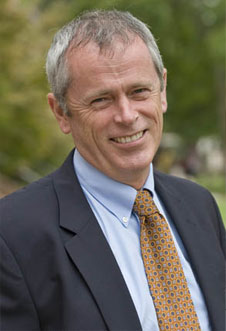 Dear Whiting School Community,
Dear Whiting School Community,
On March 17, our colleagues at the Applied Physics Laboratory achieved an astonishing feat when the Messenger spacecraft inserted itself into an elliptical orbit around Mercury.
For the next year, the spacecraft will orbit Mercury roughly 700 times to map its surface, observe its magnetic fields, and examine its composition. The first data, pictures of craters that might host water-even ice-began streaming into APL’s Laurel, MD, lab shortly after 5 a.m. on March 29.
It took seven years for the satellite to reach Mercury. The trip was in no way a straight line. Our colleagues, working with scientists across the country, plotted a course through the inner solar system, looping Earth once, Venus twice, and Mercury three times, to avoid the gravitational pull of the sun. At the conclusion of its mission, the spacecraft will exhaust its fuel, crashing into the planet’s surface.
Still, what’s most impressive to me is not this singular feat of engineering.
It’s the possibility of what a systems approach to problem solving can accomplish when taking on the most daunting, most challenging, seemingly impossible tasks. The Messenger mission is an example of systems engineering at its best. It is an example of systems engineering contributing to the betterment of human knowledge.
That is why it is with great excitement that I share with you news of a new collaborative Johns Hopkins Systems Institute, based in the Whiting School. In short, this virtual center will connect experts in engineering, medicine, public health, education, and social and physical sciences so that they may tackle the nation’s pressing problems. As with the Messenger mission, our researchers will chart a flight path for solving some of our seemingly most difficult societal challenges.
Mo Dehghani, of APL, will serve as founding director, and Tak Igusa, of the Whiting School’s Department of Civil Engineering, will serve as associate director. These visionaries will harness the best of our basic and applied expertise across the institution, and promote a cross-pollination of ideas. Indeed, we have been operating in this mode, and we have had successes: Robotic-assisted surgery that allows us to tackle procedures never deemed possible comes immediately to mind.
But what comes next? Can we preserve our dwindling fresh water resources? Can we chart a course so that each person receives adequate and appropriate health care? Can we find an energy source that fuels our economies but does not deplete our natural resources? Can we educate our youth so that they, too, can push civilization to greater heights? I think we can.
Our Systems Institute, with the Global Water Program, the Individualized Health Initiative, the Environment, Energy, Sustainability and Health Institute, and other yet-to-be-formed academic ventures, will tackle these, and other, challenges. I’m excited to invite you along as we explore our newest frontiers.
Best,
Nicholas P. Jones
Benjamin T. Rome Dean, Whiting School of Engineering




